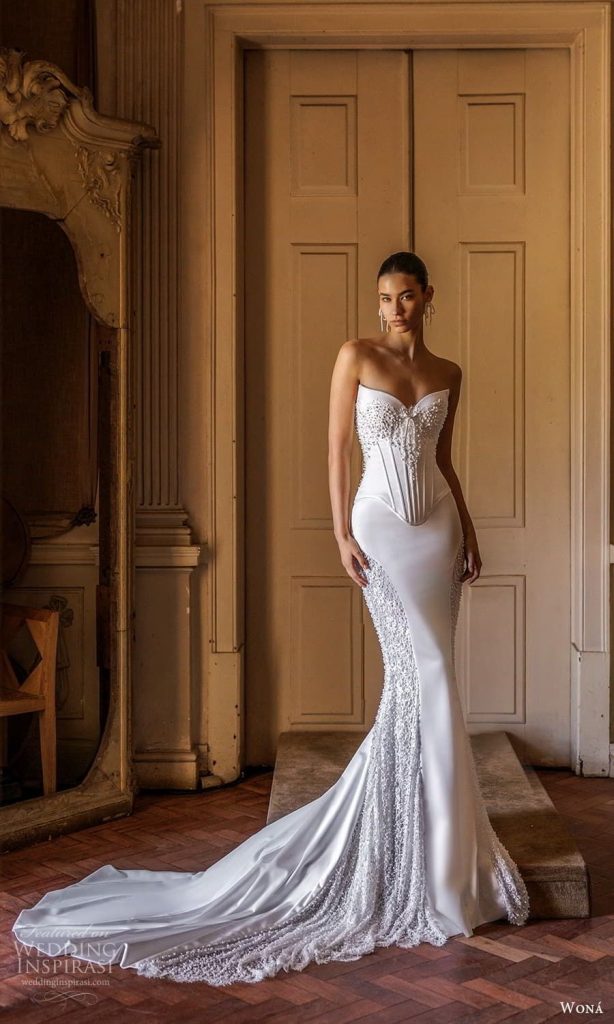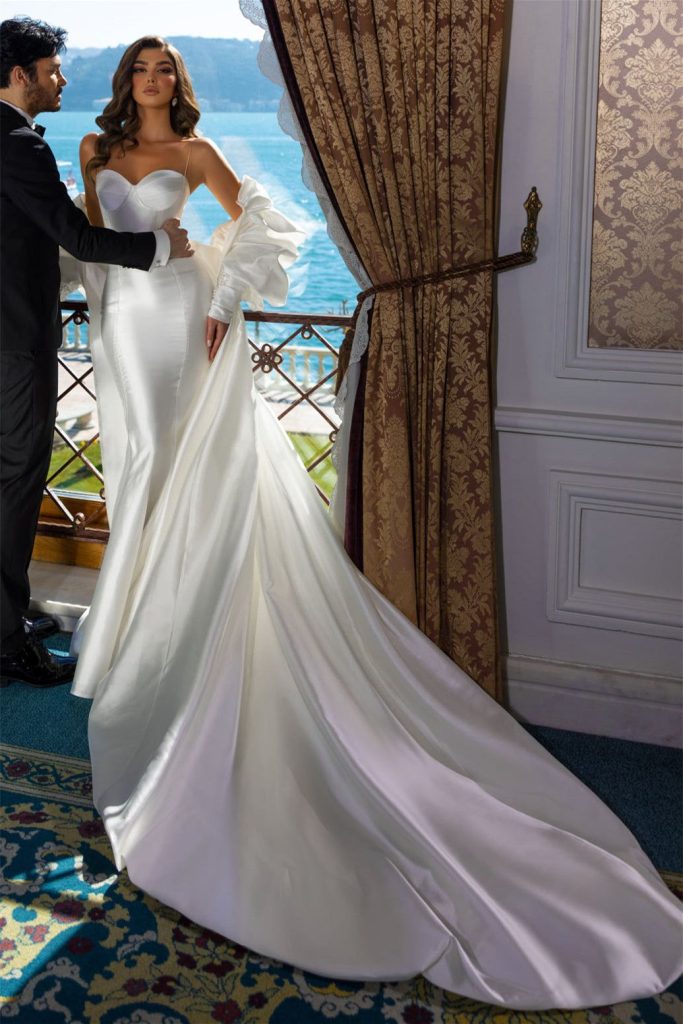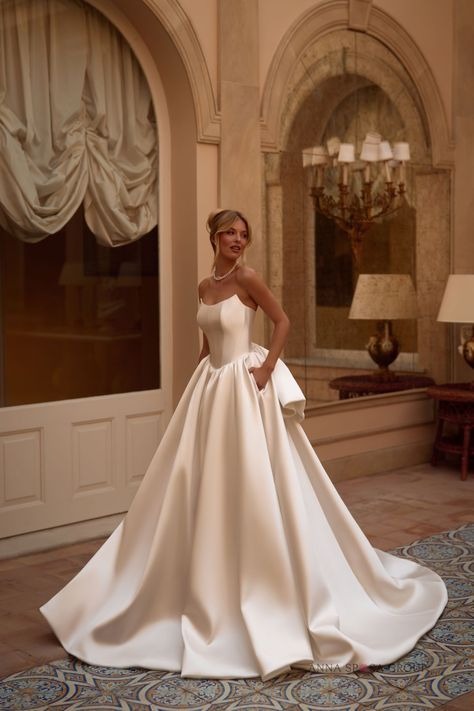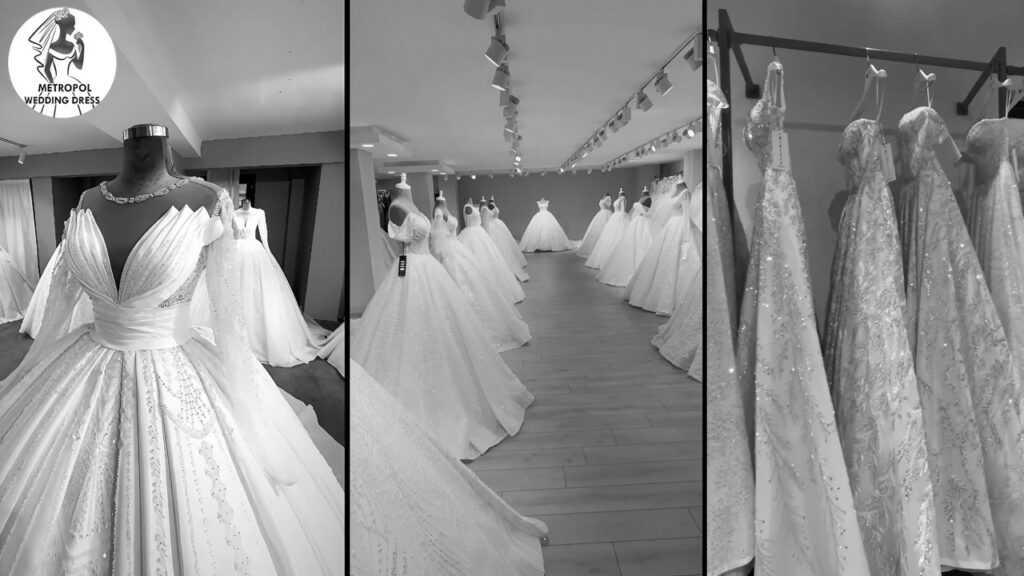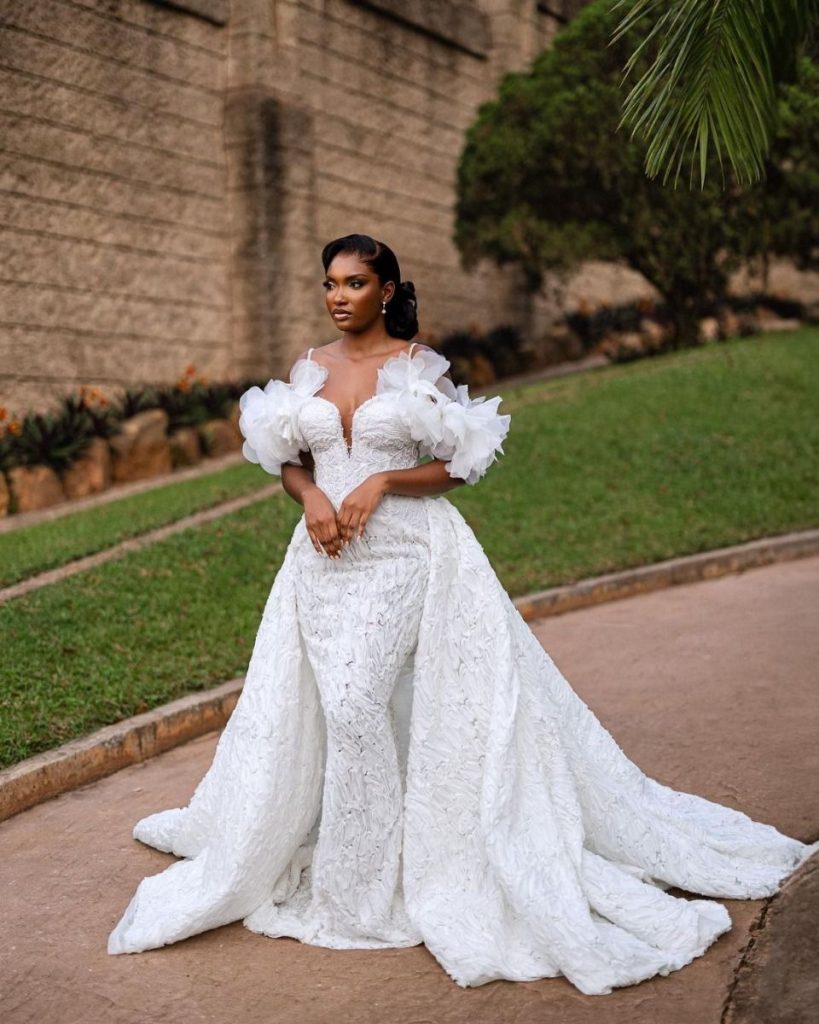
Bridal Gown Alterations in Turkey has emerged as a premier destination for bridal fashion, renowned for its exquisite craftsmanship, luxurious fabrics, and competitive pricing. Bridal gown alterations in Turkey are particularly sought after by brides and retailers worldwide, offering high-quality customization services at a fraction of the cost of Western boutiques. From Istanbul’s bustling bridal districts to skilled tailors in Izmir, Turkey combines traditional techniques with modern trends to deliver perfectly tailored wedding dresses. This comprehensive guide explores the world of bridal gown alterations in Turkey, covering costs, processes, top providers, and practical tips for achieving a flawless fit. F
Understanding Bridal Gown Alterations in Turkey
Bridal gown alterations in Turkey refer to professional customization services offered by tailors, boutiques, and manufacturers to ensure a wedding dress fits perfectly and aligns with the bride’s vision. Turkey’s bridal industry, centered in cities like Istanbul and Izmir, is known for its high-quality craftsmanship, intricate embroidery, and affordable pricing. These services cater to both local and international brides, with options for in-person fittings and online orders. Here’s an in-depth look at what bridal gown alterations in Turkey entail:
- What Are Bridal Gown Alterations in Turkey?:
- Alterations include hemming, resizing, adding bustles, adjusting straps, re-beading, and customizing necklines or sleeves to suit a bride’s body shape and style preferences.
- Services are available through luxury boutiques (e.g., Vakko Wedding, Pronovias), local tailors, and manufacturers like Metropol Wedding Dress, as well as online platforms like Istanbul Fashion Center.
- Prices range from $30–$500, significantly lower than the $150–$1,000 charged by Western boutiques, due to Turkey’s skilled labor force and economies of scale.
- Why Choose Turkey for Alterations?:
- Affordability: Alterations cost 50–80% less than in the US or Europe. For example, a hem costs $30–$100 in Turkey compared to $150–$450 in the US.
- Quality: Turkish tailors are renowned for their expertise in handling delicate fabrics like silk, satin, and lace, with intricate embroidery and beading.
- Customization: Bespoke services allow brides to modify designs, such as adding long sleeves for modesty or reshaping necklines for modern aesthetics.
- Global Accessibility: Many providers offer international shipping, with online platforms facilitating virtual consultations and orders.
- Common Alteration Services:
- Hemming: Shortening the dress to match the bride’s height and shoes. Costs $30–$100.
- Bustle Additions: Adding loops or buttons to lift the train for dancing. Costs $20–$80.
- Side Seam Adjustments: Taking in or letting out the bodice or skirt. Costs $40–$150.
- Strap Modifications: Adjusting, shortening, or adding straps. Costs $15–$50 per strap.
- Beading and Lace Work: Reapplying or adding embellishments. Costs $30–$50 per hour.
- Neckline or Sleeve Alterations: Reshaping or adding sleeves for style or modesty. Costs $50–$200.
- Where to Find Alterations in Turkey:
- Istanbul: Nişantaşı and Fatih districts host luxury boutiques (e.g., Galia Lahav, Pronovias) and markets like Fevzi Paşa Street for affordable options.
- Izmir: Home to manufacturers like Metropol Wedding Dress, offering factory-direct alterations.
- Online: Platforms like istanbulfashioncenter.com and amaryabridal.com provide customization services with global shipping.
- Boutiques: Vakko Wedding and Nova Bella Bridal offer personalized in-store alterations.
The Cost of Bridal Gown Alterations in Turkey
The cost of bridal gown alterations in Turkey varies based on the complexity, fabric type, and provider. Turkey’s competitive pricing makes it a top choice for brides and retailers seeking high-quality customizations at affordable rates. Here’s a detailed breakdown of costs:
- Average Costs for Alterations:
- Hemming: $30–$100, depending on the number of layers and embellishments. Simple hems cost $30–$50, while beaded or multi-layered hems cost $50–$100.
- Bustle Additions: $20–$80 for 1–7 bustle points. Providers like Metropol Wedding Dress charge $20–$50, compared to $65–$200 in the US.
- Side Seam Adjustments: $40–$150 to take in or let out the bodice or skirt. Complex designs with boning or corsets cost more.
- Strap Modifications: $15–$50 per strap for shortening, lengthening, or adding new straps. Adding sleeves costs $50–$150.
- Bodice Adjustments: $50–$200 for reshaping darts or resizing the bust/waist. Intricate designs increase costs.
- Beading and Lace Work: $30–$50 per hour for re-beading or applying lace appliqués, compared to $100/hour in Western boutiques.
- Rush Fees: $10–$50 for orders completed in under 21 days.
- Factors Affecting Costs:
- Fabric Type: Delicate fabrics like silk or lace require hand-stitching, increasing costs. Chiffon or tulle is cheaper to alter.
- Embellishments: Beaded or embroidered gowns require meticulous reapplication, adding $30–$50/hour.
- Complexity: Multiple alterations (e.g., hem, bustle, and bodice) increase costs, especially with a la carte pricing.
- Provider Location: Istanbul’s luxury boutiques (e.g., Galia Lahav) charge higher rates ($100–$500) than markets like Fatih ($30–$150).
- Timeline: Rush orders under 10–21 days incur additional fees.
- Comparison with Western Boutiques:
- US Boutiques: Average alteration costs range from $150–$800, with flat fees often reaching $500–$1,000.
- UK Boutiques: Costs average £250–£450 per dress, with complex alterations exceeding £1,000.
- Turkey: Alterations cost $30–$500, with many providers offering free shipping for online orders.
- Tips for Saving Money:
- Choose local tailors in Fatih or Laleli for lower prices, with bargaining common in markets.
- Purchase alterations from factory-direct providers like Istanbul Fashion Center for savings up to 80%.
- Opt for simpler gowns with fewer layers or embellishments to reduce costs.
- Order 2–4 months in advance to avoid rush fees.
Bridal gown alterations in Turkey offer exceptional value, combining affordability with high-quality craftsmanship for brides and retailers worldwide.
The Process of Bridal Gown Alterations in Turkey
The process of bridal gown alterations in Turkey is streamlined, whether through in-person fittings or online services. Turkish tailors and manufacturers combine traditional craftsmanship with modern efficiency to deliver perfectly tailored gowns. Here’s how the process works:
- Step-by-Step Process:
- Consultation and Measurements:
- In-Person: Visit boutiques like Nova Bella Bridal or markets in Fatih for measurements by skilled tailors.
- Online: Submit measurements (bust, waist, hips, height) via forms on websites like amaryabridal.com. Providers offer detailed measurement guides.
- Consultations cover desired changes, such as hemming, adding sleeves, or re-beading, with brides providing photos or sketches.
- Pinning and Design:
- Tailors pin the dress to mark adjustments, ensuring a perfect fit. For online orders, mock-ups are created based on measurements.
- Complex alterations (e.g., neckline reshaping) may involve new patterns, especially for custom designs by designers like Tarik Ediz.
- Alteration Execution:
- Skilled seamstresses use industrial machines and hand-stitching for delicate fabrics like silk or lace.
- Beading and embroidery are done by artisans, ensuring intricate details are preserved.
- Manufacturers like Metropol Wedding Dress perform quality checks at each step.
- Fittings and Adjustments:
- In-person services require 2–3 fittings over 8–12 weeks.
- For online orders, initial alterations are completed, with final tweaks done locally if needed.
- Final Inspection and Delivery:
- Dresses undergo quality inspections to ensure flawless seams, beads, and fabrics.
- Gowns are steamed and shipped, with delivery taking 7–20 days globally or available for pickup in Turkey.
- Consultation and Measurements:
- Advantages of Turkey’s Alteration Process:
- Speed: Alterations take 1–2 months, compared to 2–4 months at Western boutiques.
- Expertise: Turkish tailors specialize in bridal gowns, with expertise in intricate embroidery and beading.
- Cost Efficiency: Lower labor costs and bulk material purchasing reduce prices without sacrificing quality.
- Global Reach: Providers ship internationally, with free shipping on platforms like amaryabridal.com.
- Challenges and Solutions:
- Fit Accuracy: Online orders rely on precise measurements. Use a professional tailor or follow provider guides to avoid issues.
- Communication: Language barriers may occur in markets. Many boutiques (e.g., Pronovias) have English-speaking staff or use translation apps.
- Quality Control: Request photos or videos of the altered gown before shipping to ensure satisfaction.
The alteration process in Turkey is efficient and affordable, making it a top choice for brides seeking high-quality customizations.
Benefits of Bridal Gown Alterations in Turkey
Turkey’s bridal gown alteration services offer numerous benefits, making them a preferred choice for brides and retailers. Here’s why sourcing alterations in Turkey is advantageous:
- Cost Savings:
- Alterations cost $30–$500, compared to $150–$1,000 in Western boutiques. For example, a bustle costs $20–$80 in Turkey, versus $120–$200 in the US.
- Bargaining in markets like Fatih or Laleli can further reduce costs.
- High-Quality Craftsmanship:
- Turkish tailors are renowned for their expertise in handling luxurious fabrics like silk, satin, and lace, with intricate embroidery and beading.
- Designers like Dilek Hanif and Tarik Ediz ensure meticulous attention to detail, creating couture-quality alterations.
- Customization Options:
- Bespoke services allow brides to add sleeves, reshape necklines, or create custom bustles, catering to traditional or modern styles.
- Retailers can purchase alterations for branded collections, enhancing their offerings.
- Accessibility:
- Istanbul’s Nişantaşı and Fatih districts offer in-person fittings, while online platforms like istanbulfashioncenter.com provide global access.
- Many providers offer virtual consultations and international shipping ($10–$50).
- Cultural and Modern Blend:
- Alterations can incorporate traditional Turkish elements, such as red veils or gold coin embellishments, or modern minimalist designs.
- Designers like Nihan Peker offer elegant, contemporary alterations for minimalist brides.
- Tips for Maximizing Benefits:
- Visit bridal fairs in Istanbul or Izmir for exclusive discounts and a wide range of alteration services.
- Request samples or photos of previous work to assess quality.
- Use sourcing agents to connect with reliable providers for better pricing.
- Check reviews on platforms like Reddit or Tripadvisor for provider reliability.
Bridal gown alterations in Turkey combine affordability, quality, and customization, making them ideal for brides and retailers worldwide.
Top Providers of Bridal Gown Alterations in Turkey
Turkey is home to a range of providers offering bridal gown alterations, from luxury boutiques to affordable markets and online platforms. Here are the top options:
- Metropol Wedding Dress (metropolweddingdress.com):
- Location: Konak, Izmir
- Services: Hemming ($30–$100), bustles ($20–$80), side seam adjustments ($40–$150), and re-beading ($30/hour).
- Specialty: Combines traditional craftsmanship with 2025 bridal trends, such as drop-waist gowns. Produces high-quality alterations for retail and wholesale markets.
- Pricing: $30–$500, with discounts for bulk orders.
- Why Choose: Established in 2004, with a 1,200-square-meter workshop and global exports.
- Istanbul Fashion Center (istanbulfashioncenter.com):
- Location: Istanbul
- Services: Custom hemming, strap adjustments, and embellishment work. Prices start at $30.
- Specialty: Offers customization for wholesale gowns, with intricate lacework and luxurious fabrics.
- Pricing: $30–$300, with free shipping on bulk orders.
- Why Choose: Trusted by retailers worldwide, with a wide range of styles.
- Amarya Bridal (amaryabridal.com):
- Location: Istanbul
- Services: Bespoke alterations, including sleeve additions and neckline reshaping. Prices start at $20.
- Specialty: Offers design flexibility for custom gowns, with a focus on luxurious fabrics.
- Pricing: $20–$300, with global shipping.
- Why Choose: Known for designer-quality alterations at competitive prices.
- Galia Lahav (galialahav.com):
- Location: Istanbul (Vakko Boutique)
- Services: Couture alterations for custom gowns, including beading and bodice adjustments. Prices start at $100.
- Specialty: Luxury bridal boutique with personalized consultations and high-end craftsmanship.
- Pricing: $100–$500, with a focus on couture collections.
- Why Choose: Offers a premium experience with expert stylists and exclusive designs.
- Nova Bella Bridal (novabellabridal.com):
- Location: Nişantaşı, Istanbul
- Services: Personalized alterations for classic and avant-garde gowns. Prices start at $50.
- Specialty: Combines fashion-forward designs with tailored fittings for a perfect fit.
- Pricing: $50–$400, with in-store consultations.
- Why Choose: Known for its one-of-a-kind atmosphere and diverse gown selection.
Tips for Choosing a Provider:
- Verify credentials on platforms like Tripadvisor or Reddit for reliability.
- Request photos of previous alteration work to assess quality.
- Contact providers directly for quotes (e.g., via istanbulfashioncenter.com).
- Use sourcing agents for factory-direct pricing and quality assurance.
These providers offer top-tier bridal gown alterations in Turkey, ensuring quality and affordability for a perfect fit.
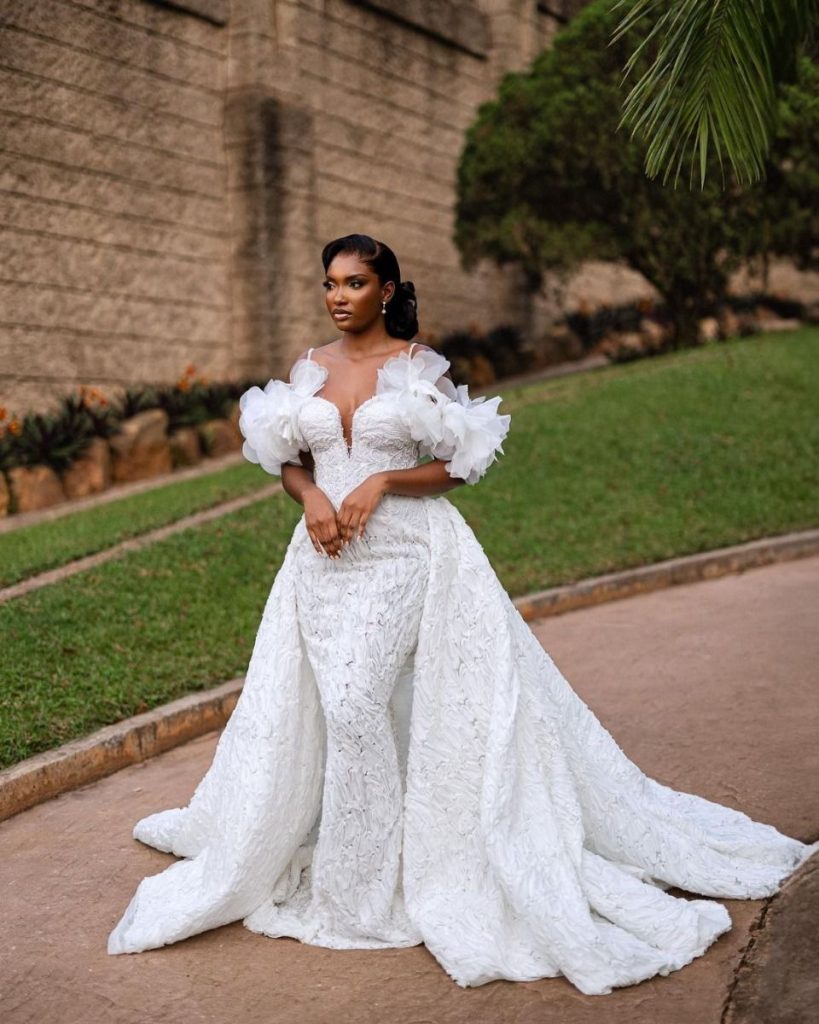
How to Source Bridal Gown Alterations in Turkey
Sourcing bridal gown alterations in Turkey requires strategic planning to ensure quality and timely delivery. Here’s a step-by-step guide:
- Step 1: Identify Needs:
- Determine specific alterations (e.g., hemming, bustle, sleeve additions) and gather reference photos or sketches.
- Specify fabric type and embellishment details for accurate quotes.
- Step 2: Research Providers:
- Visit boutiques in Nişantaşı or Fatih for in-person fittings.
- Browse online platforms like istanbulfashioncenter.com or amaryabridal.com for remote services.
- Use sourcing agents to connect with reliable manufacturers like Metropol Wedding Dress.
- Step 3: Submit Measurements and Requests:
- Provide accurate measurements using a professional tailor or provider guides.
- Clearly communicate alteration requests, including style preferences and timeline.
- Step 4: Request Quotes:
- Contact multiple providers for quotes, comparing prices and timelines.
- Expect costs of $30–$500 for in-person or online services.
- Step 5: Confirm Timeline and Shipping:
- Agree on a timeline (1–2 months for production, 7–20 days for shipping).
- Confirm shipping costs ($10–$50) and tracking options.
- Order early to avoid rush fees.
- Step 6: Review and Finalize:
- Request progress photos or videos to verify alterations before shipping.
- Approve the final product or arrange local tweaks if needed ($15–$100).
- Tips for Success:
- Check reviews on Reddit or Tripadvisor for provider reliability.
- Bargain politely in markets like Fatih for discounts.
- Use English-speaking providers (e.g., Pronovias) or translation apps to avoid communication issues.
- Plan for local fittings post-delivery to ensure a perfect fit.
Sourcing bridal gown alterations in Turkey is straightforward with proper research and communication, offering significant savings and quality results.
Challenges and Solutions for Bridal Gown Alterations in Turkey
While bridal gown alterations in Turkey offer cost savings and quality, there are potential challenges. Here’s how to address them:
- Challenge: Fit Accuracy:
- Issue: Online orders rely on precise measurements, which can lead to fit issues if inaccurate.
- Solution: Use a professional tailor for measurements or follow provider guides. Request mock-ups or progress photos to verify fit.
- Challenge: Language Barriers:
- Issue: Communication in markets or with local tailors may be hindered by language differences.
- Solution: Choose providers with English-speaking staff (e.g., Vakko Wedding) or use translation apps. Sourcing agents can also help.
- Challenge: Quality Variability:
- Issue: Some market providers may cut corners to offer lower prices.
- Solution: Choose verified providers like Metropol Wedding Dress or Galia Lahav with positive reviews on Tripadvisor or Reddit. Request samples to assess craftsmanship.
- Challenge: Shipping Delays:
- Issue: International shipping can take 7–20 days, with potential customs delays.
- Solution: Order 2–4 months in advance and use tracked shipping. Confirm delivery timelines with providers.
- Challenge: Limited Local Fittings:
- Issue: Online alterations limit in-person fittings, which are crucial for a perfect fit.
- Solution: Arrange local fittings post-delivery for minor tweaks, costing $15–$100.
By addressing these challenges, brides and retailers can ensure a seamless alteration experience in Turkey.
Tips for Brides and Retailers
To maximize the benefits of bridal gown alterations in Turkey, follow these tips:
- Set a Budget: Factor in alteration costs ($30–$500), shipping ($10–$50), and local fittings ($15–$100).
- Plan Early: Start alterations 2–4 months before the wedding to avoid rush fees and ensure timely delivery.
- Choose Simple Designs: Gowns with fewer layers or embellishments are cheaper to alter.
- Verify Quality: Request samples, photos, or videos from providers to confirm craftsmanship.
- Bargain in Markets: Negotiate politely in Fatih or Laleli for 10–20% discounts.
- Use Sourcing Agents: Connect with reliable providers through agents for better pricing.
- Check Reviews: Read feedback on Reddit, Tripadvisor, or provider websites for reliability.
- Communicate Clearly: Provide detailed instructions and photos to avoid misunderstandings.
- Consider Local Tweaks: Budget for minor local adjustments post-delivery to perfect the fit.
Conclusion
Bridal gown alterations in Turkey offer an unbeatable combination of affordability, quality, and customization, making the country a top destination for brides and retailers. From luxury boutiques like Galia Lahav in Istanbul to affordable markets in Fatih and factory-direct services from Metropol Wedding Dress, Turkey provides a range of options to suit every budget and style. Alterations cost $30–$500, compared to $150–$1,000 in Western boutiques, with skilled tailors delivering intricate embroidery and precise fittings. Whether you’re seeking a traditional Turkish gown with red veils or a modern minimalist design, Turkey’s bridal industry ensures a perfect fit. With careful planning, accurate measurements, and clear communication, brides can achieve their dream look at a fraction of the cost.
Wedding dress alterations are a pivotal part of preparing for your big day, ensuring your gown fits perfectly and reflects your unique style. From transformative before-and-after results to finding trusted local seamstresses, understanding the process, costs, and timelines is essential for a seamless experience. This comprehensive 7,000-word guide explores wedding dress alterations before and after, wedding dress alterations near me, wedding dress alteration prices, wedding dress alterations calculator, wedding dress alterations Reddit, rush wedding dress alterations, how long does a wedding dress alteration take, and how much do wedding dress alterations cost at David’s Bridal.
Wedding Dress Alterations Before and After
Wedding dress alterations before and after transformations highlight the magic of skilled tailoring, turning an off-the-rack, sample, or vintage gown into a custom-fitted masterpiece that enhances your silhouette and confidence. These changes ensure comfort and align the gown with your vision, whether modern, boho, or traditional. Here’s an in-depth look:
- What Are Wedding Dress Alterations?:
- Purpose: Alterations tailor the gown to your body, ensuring a flattering fit, ease of movement for 8–12-hour wedding days, and alignment with your aesthetic preferences (e.g., adding sleeves, reshaping necklines).
- Common Alterations:
- Hemming: Shortening the gown to match your height and shoes, preventing tripping or dragging.
- Bodice Adjustments: Taking in or letting out seams to contour the bust, waist, and hips.
- Bustle Creation: Adding loops, buttons, or hooks to lift the train for reception mobility.
- Sleeve/Strap Additions: Adding straps, sleeves, or cuffs for modesty or style, popular for 2025 trends like detachable sleeves.
- Neckline Reshaping: Modifying necklines (e.g., sweetheart to V-neck) for aesthetics or comfort.
- Beading/Lace Work: Reapplying or adding embellishments to enhance the gown’s design.
- Resizing: Adjusting the gown by 1–2 sizes, common for sample sales or pre-owned dresses.
- Vintage Restoration: Repairing tears, replacing zippers, or updating linings for heirloom gowns.
- Before and After Transformations:
- Before:
- Off-the-rack or sample gowns (e.g., size 10 for a size 6 bride) may be too long, loose, or tight, leading to an unflattering fit.
- Trains may drag excessively, posing mobility issues, or necklines may feel too revealing.
- Vintage gowns often have outdated silhouettes, tears, or worn fabrics, requiring restoration.
- Common complaints on Reddit’s r/WeddingDress include loose bodices, uneven hemlines, or missing bustles for trains.
- After:
- A tailored gown contours your body, accentuating your silhouette (e.g., A-line gowns flattering curves, mermaid gowns highlighting hourglass figures).
- Bustles (e.g., American, French, or ballroom) allow seamless transitions from ceremony to reception, as seen in Instagram posts under #WeddingDressAlterations.
- Custom additions like lace sleeves, floral appliqués, or detachable trains align with 2025 trends, creating a personalized look.
- Example: A bride on The Knot shared a before-and-after of her Maggie Sottero gown, transformed from a loose sample to a fitted A-line with a bustle and added straps ($350 total).
- Before:
- Visual Impact:
- Fit: Before alterations, a gown may sag or pinch; after, it hugs your curves seamlessly, boosting confidence for photos and dancing.
- Comfort: A dragging train or tight bodice becomes comfortable with hemming and seam adjustments, ideal for long wedding days.
- Style: Additions like beaded appliqués or off-the-shoulder straps elevate the gown, aligning with modern, boho, or modest aesthetics.
- Confidence: Brides on Reddit’s r/BigBudgetBrides report feeling “like a princess” post-alterations, with tailored gowns enhancing their wedding-day glow.
- Where to See Before and After Examples:
- Seamstress Portfolios: Studios like Bridal Alterations of Maryland (Hagerstown) or Juliya’s Custom Tailoring (Baltimore) showcase transformations on their websites or Instagram.
- Social Media: Search #WeddingDressBeforeAfter on Instagram or TikTok for real bride transformations, e.g., a loose ball gown resized to fit perfectly.
- Review Platforms: The Knot and Yelp feature bride reviews with photos, such as Pro Alterations (Pittsburgh) showing a resized mermaid gown.
- Reddit (r/WeddingDress): Brides share before-and-after photos, like a vintage gown restored with new lining and a shortened hem ($400 total).
- Tips for Brides:
- Request before-and-after photos from your seamstress to visualize potential changes, as recommended on The Knot.
- Bring wedding shoes (e.g., heel height), undergarments (e.g., shapewear), and accessories (e.g., veil) to fittings for accurate adjustments.
- Document your gown’s transformation for inspiration or resale on platforms like Stillwhite or PreOwnedWeddingDresses.com.
- Choose a seamstress with experience in your gown’s fabric (e.g., lace, silk) or style (e.g., boho vs. couture), as complex materials require specialized skills.
Wedding dress alterations before and after showcase the transformative power of tailoring, ensuring your gown fits flawlessly and reflects your unique style.
Wedding Dress Alterations Near Me
Finding reliable wedding dress alterations near me is crucial for brides seeking convenience and quality. Whether in urban hubs like Baltimore or Pittsburgh or smaller towns like Hagerstown, MD, local seamstresses and boutiques offer tailored services to perfect your gown. Here’s a comprehensive guide:
- How to Find Local Alterations:
- Online Directories:
- The Knot Marketplace: Filter by location for seamstresses like Bridal Alterations of Maryland (Hagerstown, $50–$1,500) or Pro Alterations (Pittsburgh, $50–$600).
- Yelp: Lists top-rated tailors, e.g., Seleh’s De Federal Hill (Baltimore, 4.8 stars, $100–$800) or Sew More Couture (Elkridge, MD, 4.7 stars, $50–$500).
- Bark.com: Connects brides with local seamstresses, offering free quotes in cities like Baltimore, Pittsburgh, or Denver.
- Social Media and Forums:
- Reddit (r/WeddingDress): Brides recommend tailors like Juliya’s Custom Tailoring (Baltimore, $100–$600) for beaded gowns or Edye Sanford (Hampden, MD, $50–$400) for personalized service.
- Instagram: Search hashtags like #BridalAlterationsNearMe or #PittsburghSeamstress for local portfolios showcasing transformations.
- Google Maps: Search “wedding dress alterations near me” for nearby options with ratings, e.g., The Wedding Dresser (Baltimore, 4.9 stars, $200–$1,000).
- Bridal Boutiques: Boutiques like David’s Bridal (nationwide), Posh Bridal (Frederick, MD), or MB Bride (Pittsburgh) offer in-house alterations or recommend trusted seamstresses.
- Word of Mouth: Ask recent brides, wedding planners, or photographers for referrals to reliable local tailors.
- Online Directories:
- What to Expect:
- Services: Hemming, bodice adjustments, bustle creation, sleeve additions, neckline reshaping, beading work, and vintage restoration ($50–$1,500).
- Pricing:
- Basic: $50–$200 for hemming or seam adjustments, ideal for minimalist gowns.
- Moderate: $200–$500 for bodice reshaping, bustle creation, or strap additions, common for A-line or mermaid gowns.
- Complex: $500–$1,500 for resizing, neckline reshaping, or intricate beading, typical for ball gowns or couture designs.
- Rush Fees: 20–50% surcharge for 4–6 week turnarounds.
- Timeline: 8–12 weeks with 2–3 fittings, though rush services are available for urgent needs.
- Expertise: Bridal specialists are skilled in delicate fabrics (e.g., lace, silk) and complex designs (e.g., ball gowns, mermaid silhouettes).
- Regional Highlights:
- Maryland:
- Hagerstown: Bridal Alterations of Maryland ($50–$1,500) excels in couture and vintage gowns, praised on Yelp for precision.
- Baltimore: Seleh’s De Federal Hill ($100–$800) and Juliya’s Custom Tailoring ($100–$600) are top-rated for intricate beading and resizing.
- Elkridge: Sew More Couture offers affordable alterations ($50–$500) with a focus on bridal and bridesmaid dresses.
- Pittsburgh:
- Pro Alterations: Affordable, high-quality tailoring ($50–$600), noted on Reddit for quick turnarounds.
- MB Bride: In-house alterations for purchased gowns ($100–$500), ideal for A-line or ball gowns.
- Other Areas: Use The Knot or Yelp to find tailors in smaller cities like Frederick, MD, or Annapolis, MD, with prices ranging from $50–$800.
- Maryland:
- Tips for Brides:
- Verify seamstress experience with bridal gowns through portfolios or reviews on Yelp or Trustpilot to ensure quality.
- Book fittings 3–4 months in advance, especially during peak wedding season (January–April), to secure availability.
- Bring wedding shoes, undergarments (e.g., bra, shapewear), and accessories (e.g., veil) to fittings for accurate hemming and fit.
- Request a written quote during the consultation to avoid unexpected costs, as advised by Reddit’s r/WeddingDress.
- Use Google Maps to find tailors within 10–20 miles for convenience, reducing travel time for fittings.
- Challenges and Solutions:
- Limited Local Options: Rural areas may have fewer bridal specialists. Use Bark.com to find seamstresses willing to travel or check nearby cities like Baltimore or Pittsburgh.
- High Demand: Top seamstresses book quickly during peak season. Schedule early or opt for off-peak months (e.g., November) to avoid delays.
- Quality Variability: Some local tailors lack bridal expertise. Review portfolios on Instagram or Yelp for experience with similar gown styles (e.g., lace vs. satin).
Wedding dress alterations near me provide convenient, high-quality services, ensuring a perfect fit tailored to your location and needs, with prices ranging from $50–$1,500.

Wedding Dress Alteration Prices
Wedding dress alteration prices vary based on gown complexity, fabric type, alteration type, seamstress expertise, and location. Understanding these costs helps brides budget effectively for a flawless fit. Here’s a detailed breakdown:
- Price Ranges:
- Basic Alterations: $50–$200 for simple adjustments like hemming or seam tweaks, common for minimalist or sheath gowns (e.g., satin, single-layer trains).
- Moderate Alterations: $200–$500 for multiple changes, such as bodice reshaping, bustle creation, or strap additions, typical for A-line or mermaid gowns.
- Complex Alterations: $500–$1,500 for extensive customizations, like resizing, neckline reshaping, or intricate beading work, common for ball gowns or couture designs.
- Rush Fees: 20–50% surcharge for alterations completed in 4–6 weeks (e.g., $200 alteration becomes $240–$300).
- Additional Costs:
- Steaming/Pressing: $20–$50 to ensure a polished look.
- Extra Fittings: $25–$100 each for complex gowns requiring additional sessions.
- Shipping/Storage: $10–$50 for gown delivery or storage until the wedding.
- Factors Influencing Prices:
- Gown Complexity:
- Simple Gowns: Minimalist designs (e.g., crepe sheath) require fewer adjustments ($50–$200).
- Complex Gowns: Ball gowns with multiple layers or beaded mermaid gowns need intricate work ($500–$1,500).
- Fabric Type:
- Standard Fabrics: Tulle or chiffon are easier to alter, keeping costs low ($50–$200).
- Delicate Fabrics: Lace, silk, or mikado require skilled handling, increasing costs ($100–$500).
- Alteration Type:
- Hemming: $50–$200, depending on layers (e.g., single-layer: $50–$100; multi-tiered train: $100–$200).
- Bodice Adjustments: $50–$150 for seam tweaks; $100–$300 for resizing.
- Bustle Creation: $20–$100 per bustle point (1–5 points, depending on train length).
- Sleeve/Strap Additions: $50–$200 (straps: $50–$100; sleeves: $100–$200).
- Neckline Reshaping: $50–$150 for modifications like sweetheart to V-neck.
- Beading/Lace Work: $30–$100/hour due to time-intensive handwork (2–10 hours for complex gowns).
- Vintage Restoration: $50–$300 for repairs like zipper replacement or tear mending.
- Seamstress Expertise:
- Local Seamstresses: $50–$300 for basic to moderate alterations, ideal for budget-conscious brides.
- Bridal Specialists: $200–$1,500 for couture or vintage gowns, offering premium craftsmanship.
- Location:
- Urban Areas: Higher costs in cities like Baltimore ($100–$800) or Pittsburgh ($50–$600) due to demand and overhead.
- Rural Areas: Lower costs in towns like Hagerstown, MD ($50–$500), reflecting lower operating costs.
- Season: Peak wedding season (January–April) may increase prices due to high demand, with rush fees common.
- Gown Complexity:
- Regional Pricing:
- Maryland:
- Hagerstown: Bridal Alterations of Maryland ($50–$1,500), praised on Yelp for couture work.
- Baltimore: Seleh’s De Federal Hill ($100–$800) or Juliya’s Custom Tailoring ($100–$600) for intricate beading.
- Elkridge: Sew More Couture ($50–$500) for affordable bridal alterations.
- Pittsburgh:
- Pro Alterations: $50–$600, more affordable than boutiques like MB Bride ($100–$500).
- David’s Bridal (Nationwide): $100–$600, discussed in detail later.
- Comparison: U.S. prices ($50–$1,500) are generally lower than UK ($200–$1,500) but higher than budget markets like Turkey ($30–$500).
- Maryland:
- Tips for Managing Costs:
- Request a detailed, written quote during the first fitting to avoid surprises, as advised by Reddit’s r/WeddingDress.
- Choose simpler gowns (e.g., sheath vs. ball gown) to minimize alteration needs and costs.
- Book during off-peak months (e.g., November) to avoid rush fees and secure better rates.
- Compare quotes from multiple seamstresses using The Knot Marketplace or Bark.com to find the best value.
- Budget 10–20% of your gown’s cost for alterations (e.g., $100–$400 for a $2,000 gown) when planning your wedding expenses.
- Challenges and Solutions:
- Cost Overruns: Complex gowns like beaded ball gowns may exceed initial quotes. Request a fixed-price contract or a cap on beading hours to control costs.
- Hidden Fees: Some seamstresses charge for extra fittings or steaming. Confirm all potential costs upfront during the consultation.
- Rush Orders: Tight timelines increase costs significantly. Start alterations 3–4 months in advance to avoid rush fees.
Wedding dress alteration prices range from $50–$1,500, with careful planning and comparison shopping ensuring a perfect fit within your budget.
Wedding Dress Alterations Calculator
A wedding dress alterations calculator is a practical tool for estimating costs based on gown type, alteration needs, location, and timeline. While no universal online calculator exists, this section provides a detailed framework to estimate costs, with sample calculations and regional insights to help brides budget effectively.
- How to Calculate Alteration Costs:
- Step 1: Identify Gown Type:
- Simple (Sheath, Minimalist): $50–$200 for basic adjustments like hemming or seam tweaks, common for satin or crepe gowns.
- Moderate (A-Line, Mermaid): $200–$500 for multiple changes like bodice reshaping or bustle creation.
- Complex (Ball Gown, Beaded, Couture): $500–$1,500 for intricate work like resizing, neckline reshaping, or beading.
- Step 2: List Alteration Needs:
- Hemming: $50–$200 (single-layer: $50–$100; multi-layer train: $100–$200).
- Bodice Adjustments: $50–$150 (seam tweaks); $100–$300 (resizing 1–2 sizes).
- Bustle Creation: $20–$100 per bustle point (1–5 points, depending on train length; e.g., American bustle: 1–2 points, ballroom bustle: 3–5 points).
- Sleeve/Strap Additions: $50–$200 (straps: $50–$100; lace sleeves: $100–$200).
- Neckline Reshaping: $50–$150 (e.g., sweetheart to V-neck).
- Beading/Lace Work: $30–$100/hour (2–10 hours for complex gowns with heavy embellishments).
- Vintage Restoration: $50–$300 (e.g., zipper replacement, tear repairs, lining updates).
- Step 3: Factor in Location:
- High-Cost Areas (e.g., Baltimore, D.C.): Add 10–20% to base costs due to higher demand and overhead ($100–$800).
- Moderate-Cost Areas (e.g., Pittsburgh, Hagerstown): Use base costs as a guide ($50–$600).
- Low-Cost Areas (e.g., rural Maryland, small towns): Subtract 10–20% from base costs ($50–$500).
- Step 4: Add Rush Fees:
- 20–50% surcharge for 4–6 week turnarounds (e.g., $200 alteration becomes $240–$300).
- 50–100% surcharge for 1–2 week rush alterations, limited to simple gowns.
- Step 5: Include Additional Costs:
- Steaming/pressing: $20–$50 for a polished finish.
- Extra fittings: $25–$100 each for complex gowns requiring additional sessions.
- Shipping/storage: $10–$50 for gown delivery or storage until the wedding.
- Step 1: Identify Gown Type:
- Sample Calculations:
- Simple Gown (Sheath, Pittsburgh, Pro Alterations):
- Hemming: $50
- Seam adjustments: $50
- Steaming: $20
- Total: $120 (6–8 weeks)
- Moderate Gown (A-Line, Baltimore, Seleh’s De Federal Hill):
- Hemming: $100
- Bodice adjustments: $100
- Bustle (3 points): $60
- Steaming: $30
- Total: $290 (8–10 weeks)
- Complex Gown (Beaded Ball Gown, Hagerstown, Bridal Alterations of Maryland):
- Hemming: $200
- Resizing: $300
- Bustle (5 points): $100
- Beading work (5 hours): $250
- Rush fee (4 weeks): $150
- Steaming: $50
- Total: $1,050
- Simple Gown (Sheath, Pittsburgh, Pro Alterations):
- Tools and Resources for Estimating Costs:
- Online Estimates: David’s Bridal provides in-store quotes based on gown type and alterations. Visit their website or a local store for a personalized estimate.
- The Knot Marketplace: Filter by location and service to request quotes from seamstresses in Baltimore, Pittsburgh, or Hagerstown.
- Reddit (r/WeddingDress): Brides share cost breakdowns, e.g., a $500 total for a mermaid gown with bustle and sleeves in Baltimore, helping you benchmark expenses.
- Bark.com: Request free quotes from local seamstresses to compare costs and build your estimate.
- Seamstress Consultations: Most seamstresses (e.g., Juliya’s Custom Tailoring, Pro Alterations) provide detailed quotes during the first fitting, as advised by The Knot.
- Tips for Using a Calculator:
- List all desired alterations (e.g., hemming, bustle, sleeves) to avoid underestimating costs.
- Compare quotes from multiple seamstresses using The Knot or Bark.com to find the best value for your gown.
- Factor in rush fees if your wedding is less than 3 months away, as timelines impact costs.
- Budget 10–20% of your gown’s cost for alterations (e.g., $100–$400 for a $2,000 gown) to set realistic expectations.
- Check seamstress portfolios on Instagram or Yelp to ensure they have experience with your gown’s style, as this affects cost accuracy.
- Challenges and Solutions:
- Inaccurate Estimates: Complex gowns with beading or multiple layers may exceed initial quotes. Request a fixed-price contract or a cap on beading hours to control costs.
- Regional Variations: Urban areas like Baltimore charge more than rural ones like Hagerstown. Consider nearby seamstresses in less expensive areas for savings.
- Hidden Costs: Extra fittings, steaming, or rush fees can add up. Confirm all potential costs during the consultation to avoid surprises.
A wedding dress alterations calculator helps brides estimate costs accurately, with prices ranging from $50–$1,500 based on gown complexity, location, and timeline.
Wedding Dress Alterations Reddit
Wedding dress alterations Reddit is a valuable resource for brides seeking real-world insights, recommendations, and tips from communities like r/WeddingDress and r/BigBudgetBrides. These platforms offer advice on finding seamstresses, managing costs, and navigating the alteration process. Here’s a detailed overview:
- Why Use Reddit for Alterations Insights?:
- Real Bride Experiences: Brides share detailed accounts of their alteration journeys, including before-and-after photos, cost breakdowns, and seamstress recommendations.
- Community Advice: Users answer questions like “How much should alterations cost?” or “How do I find a good seamstress?” with practical, firsthand tips.
- Regional Recommendations: Brides in areas like Maryland, Pittsburgh, or Baltimore share local seamstress suggestions, e.g., Bridal Alterations of Maryland (Hagerstown) or Pro Alterations (Pittsburgh).
- Transparency: Discussions cover challenges like cost overruns, fit issues, or scheduling delays, helping brides plan effectively.
- Key Insights from Reddit (r/WeddingDress, r/BigBudgetBrides):
- Cost Discussions:
- Brides report spending $50–$200 for basic alterations (e.g., hemming, seams) and $200–$1,500 for complex changes (e.g., resizing, beading).
- Example: A Baltimore bride shared a $450 total for a mermaid gown with bustle and sleeve additions at Juliya’s Custom Tailoring, completed in 8 weeks.
- Another bride in Pittsburgh paid $200 for hemming and a bustle at Pro Alterations, praising their affordability.
- Timeline Advice:
- Most recommend starting alterations 3–4 months before the wedding, with 2–3 fittings over 8–12 weeks for a perfect fit.
- Rush alterations (4–6 weeks) are possible but incur 20–50% surcharges, as noted in threads about Pittsburgh and Baltimore seamstresses.
- Seamstress Recommendations:
- Maryland: Bridal Alterations of Maryland (Hagerstown, $50–$1,500) praised for couture and vintage gown work, with 4.8-star Yelp reviews.
- Baltimore: Seleh’s De Federal Hill ($100–$800) and The Wedding Dresser ($200–$1,000) recommended for intricate beading and resizing.
- Pittsburgh: Pro Alterations ($50–$600) lauded for affordability and quick turnarounds, often mentioned in Pittsburgh-specific threads.
- Before and After Photos: Brides share transformations, e.g., a loose sample gown resized to fit perfectly or a vintage gown restored with new lining and a shortened hem ($400 total).
- Challenges:
- Cost Overruns: Some brides report unexpected fees for extra fittings or intricate beading. Solution: Request a detailed, written quote upfront.
- Fit Issues: Miscommunication can lead to imperfect fits. Solution: Attend all fittings with accessories (shoes, undergarments) and communicate clearly.
- Scheduling Delays: Peak season (January–April) limits seamstress availability. Solution: Book early or opt for rush services at studios like Pro Alterations.
- Cost Discussions:
- Top Reddit Tips:
- Choose Experienced Seamstresses: Check portfolios for bridal gown experience, especially for delicate fabrics (e.g., lace, silk) or complex designs (e.g., beaded ball gowns).
- Budget Wisely: Allocate 10–20% of your gown’s cost for alterations (e.g., $100–$400 for a $2,000 gown) to avoid financial surprises.
- Bring Accessories: Bring wedding shoes, undergarments (e.g., bra, shapewear), and veils to all fittings to ensure accurate hemming and fit, as emphasized in multiple threads.
- Document the Process: Take photos at each fitting to track progress and share on Reddit for feedback or inspiration.
- Research Local Options: Search threads for your area (e.g., “Baltimore alterations” or “Pittsburgh seamstress”) to find trusted recommendations.
- How to Use Reddit Effectively:
- Search keywords like “wedding dress alterations [city]” (e.g., “Baltimore,” “Pittsburgh”) in r/WeddingDress for location-specific advice.
- Post specific questions, e.g., “Has anyone used Bridal Alterations of Maryland?” to get tailored responses from brides with similar experiences.
- Check pinned posts or megathreads for alteration tips, cost breakdowns, and vendor recommendations.
- Engage with users by asking for before-and-after photos or detailed cost breakdowns to inform your planning.
- Challenges and Solutions:
- Varying Advice: Reddit opinions differ based on individual experiences. Cross-reference with Yelp or The Knot reviews for a balanced perspective.
- Outdated Threads: Some posts may be from 2023 or earlier. Focus on recent discussions (2024–2025) for current pricing and seamstress availability.
- Bias: Positive reviews may dominate popular threads. Look for balanced feedback mentioning both pros and cons to assess potential challenges.
Wedding dress alterations Reddit offers a wealth of bride-driven insights, helping you find trusted seamstresses, estimate costs, and navigate the alteration process with confidence.
Rush Wedding Dress Alterations
Rush wedding dress alterations are a lifeline for brides with tight timelines, ensuring a perfect fit despite limited time due to late gown deliveries, last-minute purchases, or unexpected changes. These expedited services come with a premium but deliver results quickly. Here’s a detailed guide:
- What Are Rush Alterations?:
- Definition: Alterations completed in 4–6 weeks (vs. standard 8–12 weeks), requiring expedited fittings and priority scheduling to meet tight deadlines.
- Services: Identical to standard alterations, including hemming, bodice adjustments, bustle creation, sleeve additions, neckline reshaping, beading work, and vintage restoration.
- Cost: 20–50% surcharge on standard prices (e.g., $200 alteration becomes $240–$300); 50–100% surcharge for extreme rush (1–2 weeks).
- Availability: Offered by studios like Bridal Alterations of Maryland (Hagerstown), Pro Alterations (Pittsburgh), Seleh’s De Federal Hill (Baltimore), and David’s Bridal (nationwide).
- Rush Timeline:
- 4–6 Weeks: Standard rush timeline for basic to moderate alterations (e.g., hemming, seams, bustle), typically involving 1–2 fittings.
- First Fitting: Within 1–2 days of booking, to pin and assess adjustments (1–2 hours).
- Second Fitting (Optional): 2–3 weeks later, to preview basted changes (1 hour).
- Final Fitting: 1–2 days before pickup, to confirm fit and steam/press the gown (30–60 minutes).
- 1–2 Weeks (Extreme Rush): Limited to simple alterations (e.g., hemming, minor seam tweaks) on minimalist gowns, with a single fitting and 50–100% surcharges.
- Examples:
- Pro Alterations (Pittsburgh): 4-week rush for hemming and bustle ($60–$900).
- Bridal Alterations of Maryland (Hagerstown): 6-week rush for resizing and beading ($60–$2,250).
- Seleh’s De Federal Hill (Baltimore): 4-week rush for bodice adjustments and straps ($120–$1,200).
- 4–6 Weeks: Standard rush timeline for basic to moderate alterations (e.g., hemming, seams, bustle), typically involving 1–2 fittings.
- Pricing:
- Basic Rush Alterations: $60–$300 (e.g., hemming: $60–$150; seam tweaks: $60–$100).
- Moderate Rush Alterations: $240–$750 (e.g., bodice reshaping: $120–$225; bustle: $24–$150).
- Complex Rush Alterations: $600–$2,250 (e.g., resizing: $120–$450; beading: $36–$150/hour).
- Additional Costs:
- Steaming/pressing: $20–$50.
- Extra fittings: $25–$100 each.
- Regional Examples:
- Hagerstown, MD (Bridal Alterations of Maryland): $60–$2,250 for rush couture alterations, including beading and resizing.
- Baltimore, MD (Seleh’s De Federal Hill): $120–$1,200 for rush beading and bodice work.
- Pittsburgh, PA (Pro Alterations): $60–$900 for rush hemming, seams, and bustles, praised on Reddit for efficiency.
- David’s Bridal (Nationwide): $120–$900 for rush alterations, discussed later.
- Where to Find Rush Alterations:
- Maryland:
- Hagerstown: Bridal Alterations of Maryland ($60–$2,250) offers rush services with 4–6 week turnarounds, noted on Yelp for reliability.
- Elkridge: Sew More Couture handles rush hemming and seams ($60–$750), ideal for simpler gowns.
- Baltimore:
- Seleh’s De Federal Hill: Specializes in rush beading and resizing ($120–$1,200), with 4.8-star Yelp reviews.
- Juliya’s Custom Tailoring: Offers 4-week rush services ($120–$900), praised for precision.
- Pittsburgh:
- Pro Alterations: Affordable rush alterations ($60–$900), recommended on Reddit for quick turnarounds.
- MB Bride: In-house rush services for purchased gowns ($120–$750), convenient for Pittsburgh brides.
- David’s Bridal (Nationwide): Rush alterations in 4–6 weeks ($120–$900), available at stores like Baltimore and Pittsburgh.
- Maryland:
- Tips for Rush Alterations:
- Book immediately to secure priority scheduling, as rush slots are limited during peak season (January–April), per The Knot.
- Choose simpler gowns (e.g., sheath or A-line) for faster turnarounds, as complex gowns (e.g., beaded ball gowns) require more time.
- Communicate your wedding date and urgency clearly to confirm the seamstress can meet your deadline.
- Budget for rush fees (20–50% for 4–6 weeks; 50–100% for 1–2 weeks) and confirm all costs upfront.
- Bring all accessories (shoes, undergarments, veil) to the first fitting to streamline the process and avoid delays.
- Challenges and Solutions:
- Limited Availability: Rush slots fill quickly during peak season. Contact multiple seamstresses via Bark.com or The Knot Marketplace to find openings.
- Higher Costs: Rush fees significantly increase expenses. Compare quotes from studios like Pro Alterations to find affordable options.
- Quality Risks: Rushed work may compromise precision, especially for complex gowns. Choose experienced seamstresses with strong Yelp or Reddit reviews to ensure quality.
Rush wedding dress alterations ensure a perfect fit in as little as 4 weeks, with trusted seamstresses like Pro Alterations or Bridal Alterations of Maryland delivering flawless results under tight deadlines.
How Long Does a Wedding Dress Alteration Take
Understanding how long does a wedding dress alteration take is critical for planning your wedding timeline, as alterations require multiple fittings to achieve a perfect fit. Timelines vary based on gown complexity, alteration type, and seamstress availability. Here’s a detailed guide:
- Standard Timeline:
- Duration: 8–12 weeks for most wedding dress alterations, typically involving 2–3 fittings to ensure precision.
- First Fitting (3–4 Months Before Wedding): The seamstress assesses the gown, takes measurements, and pins for initial adjustments (e.g., hemming, bodice reshaping). Duration: 1–2 hours.
- Second Fitting (6–8 Weeks Before Wedding): The gown is basted (temporary stitches) to preview the fit, with adjustments like bustle creation or sleeve additions reviewed. Duration: 1–1.5 hours.
- Final Fitting (1–2 Weeks Before Wedding): Final tweaks are made to perfect the fit, and the gown is steamed or pressed for a polished look. Duration: 30–60 minutes.
- Complex Gowns: Ball gowns, beaded designs, or vintage gowns may require 3–4 fittings over 10–12 weeks due to intricate work (e.g., resizing, heavy beading).
- Rush Timeline:
- 4–6 Weeks: Possible for basic to moderate alterations (e.g., hemming, seams, bustle creation) with 1–2 fittings and a 20–50% surcharge.
- First Fitting: Within 1–2 days of booking.
- Second Fitting (Optional): 2–3 weeks later.
- Final Fitting: 1–2 days before pickup.
- 1–2 Weeks (Extreme Rush): Limited to simple alterations (e.g., hemming) on minimalist gowns, with a single fitting and 50–100% surcharges.
- Examples:
- Pro Alterations (Pittsburgh): 4-week rush for hemming and bustle ($60–$900).
- Bridal Alterations of Maryland (Hagerstown): 6-week rush for resizing and beading ($60–$2,250).
- Seleh’s De Federal Hill (Baltimore): 4-week rush for bodice adjustments and straps ($120–$1,200).
- 4–6 Weeks: Possible for basic to moderate alterations (e.g., hemming, seams, bustle creation) with 1–2 fittings and a 20–50% surcharge.
- Factors Affecting Timeline:
- Gown Complexity:
- Simple Gowns (e.g., Sheath, Minimalist): 6–8 weeks for basic adjustments like hemming or seams, requiring fewer fittings.
- Complex Gowns (e.g., Ball Gown, Beaded, Couture): 10–12 weeks for intricate work like resizing, beading, or layering.
- Alteration Type:
- Basic: Hemming or seam adjustments take 4–6 weeks.
- Moderate: Bodice reshaping or bustle creation takes 6–10 weeks.
- Complex: Resizing, neckline reshaping, or beading takes 10–12 weeks.
- Seamstress Availability: Peak wedding season (January–April) may extend timelines due to high demand. Booking early secures slots.
- Location: Urban studios like Baltimore’s Seleh’s De Federal Hill may have longer wait times than rural ones like Hagerstown’s Bridal Alterations of Maryland due to higher demand.
- Gown Complexity:
- Regional Insights:
- Maryland:
- Hagerstown: Bridal Alterations of Maryland recommends starting 3–4 months in advance, with rush options in 4–6 weeks ($60–$2,250).
- Elkridge: Sew More Couture suggests 2–3 months for standard alterations, with rush services for simpler gowns ($60–$750).
- Baltimore:
- Seleh’s De Federal Hill: 8–12 weeks for standard alterations, with 4-week rush options for basic to moderate changes ($120–$1,200).
- Juliya’s Custom Tailoring: 8–10 weeks, with rush services in 4 weeks ($120–$900).
- Pittsburgh:
- Pro Alterations: 6–12 weeks for standard alterations, with 4-week rush options ($60–$900), praised on Reddit for efficiency.
- MB Bride: 6–10 weeks for in-house alterations, with rush services for purchased gowns ($120–$750).
- David’s Bridal (Nationwide): 6–10 weeks for standard alterations, with rush options in 4–6 weeks ($120–$900).
- Maryland:
- Tips for Brides:
- Start alterations 3–4 months before your wedding to avoid rush fees and ensure availability, as advised by The Knot.
- Schedule fittings when your weight is stable, as significant changes after the second fitting may incur additional costs ($50–$200).
- Bring wedding shoes, undergarments (e.g., bra, shapewear), and accessories (e.g., veil) to all fittings to ensure accurate hemming and fit.
- Confirm the seamstress’s timeline upfront during the consultation to align with your wedding date.
- Choose a seamstress with bridal experience, as recommended on Reddit’s r/WeddingDress, to handle delicate fabrics or complex designs.
- Challenges and Solutions:
- Tight Timelines: Late gown delivery or last-minute purchases may require rush services. Choose studios like Pro Alterations or Seleh’s De Federal Hill with proven rush capabilities.
- Scheduling Conflicts: Peak season (January–April) limits availability. Book early or opt for off-peak months like November to secure slots.
- Complex Gowns: Intricate designs (e.g., beaded ball gowns) extend timelines. Discuss gown details during the consultation to set realistic expectations.
How long does a wedding dress alteration take typically spans 8–12 weeks, with rush options in 4–6 weeks ensuring a perfect fit for urgent needs.
How Much Do Wedding Dress Alterations Cost at David’s Bridal
How much do wedding dress alterations cost at David’s Bridal is a common question for brides shopping at this nationwide retailer, known for its affordable gowns and convenient in-house alteration services. Here’s a detailed breakdown:
- Overview:
- Services: David’s Bridal offers comprehensive alterations, including hemming, bodice adjustments, bustle creation, sleeve additions, neckline reshaping, beading work, and minor vintage restoration, primarily for gowns purchased in-store.
- Locations: Nationwide, with stores in Maryland (e.g., Hagerstown, Baltimore), Pittsburgh, and other U.S. cities, ensuring accessibility.
- Process: 2–3 fittings over 6–10 weeks, starting with a consultation to assess the gown, take measurements, and provide a detailed quote.
- Reputation: Rated 4.5–4.7 stars on The Knot and Yelp, praised for convenience and consistency, though some brides note higher costs compared to independent seamstresses.
- Pricing:
- Basic Alterations: $100–$200 for hemming or seam adjustments, common for sheath or A-line gowns (e.g., satin, single-layer trains).
- Moderate Alterations: $200–$400 for bodice reshaping, bustle creation (1–3 points), or strap additions, typical for A-line or mermaid gowns.
- Complex Alterations: $400–$600 for resizing, neckline reshaping, or intricate beading work, common for ball gowns or beaded designs.
- Rush Fees: 20–50% surcharge for 4–6 week turnarounds (e.g., $200 alteration becomes $240–$300).
- Additional Costs:
- Steaming/Pressing: $20–$50 for a polished finish.
- Extra Fittings: $25–$50 each for complex gowns requiring additional sessions.
- Non-David’s Bridal Gowns: Limited availability, with 10–20% higher costs ($120–$720) due to additional labor.
- Examples:
- Hagerstown, MD: $150 for hemming and seam adjustments on an A-line gown (6 weeks).
- Baltimore, MD: $350 for bodice reshaping, bustle (3 points), and straps on a mermaid gown (8 weeks).
- Pittsburgh, PA: $500 for resizing and beading work on a ball gown (10 weeks).
- Comparison:
- David’s Bridal: $100–$600, convenient but pricier than independent seamstresses like Pro Alterations (Pittsburgh, $50–$600) or Bridal Alterations of Maryland (Hagerstown, $50–$1,500).
- Baltimore: Seleh’s De Federal Hill ($100–$800) offers similar quality with more flexibility for non-store gowns.
- Pittsburgh: Pro Alterations ($50–$600) is more affordable, especially for rush or complex alterations.
- Customer Feedback:
- The Knot and Yelp: Brides praise David’s Bridal for seamless in-store alterations, with comments like “My gown fit perfectly, and the process was so easy!” Some note higher costs for non-David’s Bridal gowns or limited customization options.
- Reddit (r/WeddingDress): Mixed feedback, with brides recommending David’s Bridal for simple alterations ($100–$200) but suggesting independent seamstresses for complex work (e.g., adding sleeves, heavy beading) to save money.
- Challenges: Some brides report scheduling delays during peak season (January–April) or limited options for custom additions like detachable trains.
- Tips for Brides:
- Book alterations at the time of gown purchase to streamline the process, as David’s Bridal prioritizes in-store gowns for scheduling.
- Bring wedding shoes, undergarments (e.g., bra, shapewear), and accessories (e.g., veil) to all fittings to ensure accurate hemming and fit.
- Request a detailed, written quote during the consultation to avoid unexpected costs, as advised by Reddit users.
- Compare costs with local seamstresses (e.g., Pro Alterations, Juliya’s Custom Tailoring) if you own a non-David’s Bridal gown, as outside gowns may incur higher fees.
- Schedule fittings 2–3 months in advance, especially during peak season, to secure availability and avoid rush fees.
- Challenges and Solutions:
- Higher Costs: David’s Bridal alterations ($100–$600) are pricier than some independents ($50–$600). Get quotes from local seamstresses like Pro Alterations for comparison.
- Limited Non-Store Gown Services: Some stores restrict alterations for outside gowns or charge more. Confirm availability and costs upfront during the consultation.
- Scheduling Delays: Peak season can delay fittings. Book early or opt for rush services (4–6 weeks) if needed.
How much do wedding dress alterations cost at David’s Bridal ranges from $100–$600, offering convenience for in-store gowns but potentially higher costs for non-store purchases or complex alterations.
Conclusion
Wedding dress alterations are essential for achieving a flawless, comfortable fit that enhances your confidence on your big day. Wedding dress alterations before and after showcase transformative results, turning off-the-rack or vintage gowns into custom-fitted masterpieces that align with your style. Wedding dress alterations near me provide convenient access to skilled seamstresses in Maryland, Pittsburgh, Baltimore, and beyond, found via The Knot, Yelp, or Bark.com. Wedding dress alteration prices range from $50–$1,500, influenced by gown complexity, fabric type, and location. A wedding dress alterations calculator helps estimate costs, with examples for simple ($50–$200), moderate ($200–$500), and complex ($500–$1,500) gowns. Wedding dress alterations Reddit offers valuable bride-driven insights, with recommendations for trusted seamstresses like Pro Alterations (Pittsburgh, $50–$600) or Bridal Alterations of Maryland (Hagerstown, $50–$1,500). Rush wedding dress alterations ensure quick turnarounds (4–6 weeks) for urgent needs, with surcharges of 20–50%. How long does a wedding dress alteration take typically spans 8–12 weeks, with rush options in 4–6 weeks for time-sensitive brides. How much do wedding dress alterations cost at David’s Bridal ranges from $100–$600, offering convenience but higher costs for non-store gowns or complex work. By booking early, bringing accessories to fittings, comparing quotes, and choosing experienced seamstresses, brides can ensure a stress-free alteration process and a gown that fits like a dream.


